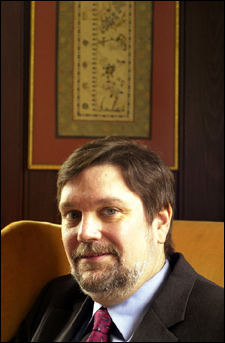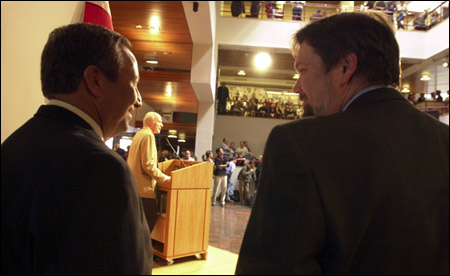Ellwood to become dean of Kennedy School
Been member of KSG faculty since 1980
David T. Ellwood, the Scott M. Black Professor of Political Economy at

the Kennedy School of Government, will become the next dean of the Kennedy School, President Lawrence H. Summers announced Wednesday (April 21).
One of the nation’s most influential scholars of poverty, welfare, and family change, Ellwood has been a member of the Kennedy School faculty since 1980 and has twice served as the School’s academic dean. An alumnus of Harvard College and the Graduate School of Arts and Sciences, he has also played a leading role in the policy arena, most prominently in the mid-1990s as a senior official in the U.S. Department of Health and Human Services and a central figure in welfare reform.
Ellwood will succeed Joseph S. Nye Jr., dean of the Kennedy School since 1995, who last fall announced his plans to step down on June 30.
“The Kennedy School lies at the heart of Harvard’s commitment to public service, and David Ellwood in many ways personifies that commitment,” said Summers. “His scholarship illuminates critical questions of public policy. His career combines impressive academic leadership with devoted service in the public interest. He is deeply dedicated to the well-being of the Kennedy School, its relations with the rest of Harvard, and its robust engagement with the larger world in an era of exceptional challenge in the U.S. and abroad. He is not only an extraordinarily able professor and public servant, but a thoughtful colleague and leader whose open mind and collaborative style promise to help the Kennedy School fulfill its vital mission in the important time ahead.”

Said Ellwood: “I feel honored and humbled by the invitation to serve as the dean of the Kennedy School, and to follow in the distinguished footsteps of Dean Nye. The essence of the Kennedy School is an abiding commitment to advancing the public interest through the influence of powerful ideas and the education of talented students. The challenges facing the world are daunting. But that makes the opportunities and responsibilities of a school such as ours all the greater.
“With the spirited efforts of faculty, students, and staff, and in partnership with people across Harvard and around the world, I have every confidence that we will together make great contributions to the shaping of public policy and to the calling of public service in the years to come,” Ellwood said.
“I am very pleased that President Summers has chosen David Ellwood as the Kennedy School’s next dean,” said Nye. “David has twice served with distinction as the School’s academic dean; he is a distinguished scholar; and his belief in the School’s mission and his own dedication to public service are exemplary for our students.”
Ellwood rose through the Kennedy School faculty ranks to become a tenured professor in 1988. His book “Poor Support: Poverty and the American Family” (1988) received several honors and established his reputation as one of the nation’s foremost scholars of poverty. In 1992-93, he served as the Kennedy School’s academic dean alongside then-Dean Albert Carnesale, while also co-directing the School’s Malcolm Wiener Center for Social Policy.
From 1993 to 1995, Ellwood took a leave from Harvard to serve in Washington as assistant secretary for Planning and Evaluation in the U.S. Department of Health and Human Services. There he emerged as a major figure in the administration’s efforts to reform welfare. His academic and policy work on welfare gave rise to the 1994 book, “Welfare Realities: From Rhetoric to Reform,” which he co-wrote with colleague Mary Jo Bane.
On returning to Harvard, Ellwood resumed service as the Kennedy School’s academic dean from 1995 to 1997, first with Dean Carnesale and then with Dean Nye. He has also played a central role in the University’s Multidisciplinary Program in Inequality and Social Policy, an ambitious interfaculty undertaking now involving some 40 faculty members from four Harvard schools, which he directed in 1998-99 and for which he continues to serve on the governing council.
In recent years, Ellwood’s work has been particularly focused on the changing structure of American families, the forces reshaping fertility and marriage patterns, and the larger implications of these changes for the society and the economy. He has also been involved in exploring both poverty and the policy process in several countries around the world. Long a popular teacher at the Kennedy School, he offers courses on markets and market failure and on wage inequality and families.
A 1975 summa cum laude graduate of Harvard College, who received his Ph.D. in economics from Harvard in 1981, Ellwood has remained actively engaged in the life of the University beyond the Kennedy School. In recent years, he has served as a member of the Committee to Visit Harvard College, the Allston planning task force on undergraduate life, and the Harvard Committee on Employment and Contracting Policies (the Katz Committee).
A fellow of the American Academy of Arts and Sciences and a member of the National Academy of Public Administration, Ellwood is a longtime research associate of the National Bureau of Economics and former director of The Aspen Institute’s bipartisan Domestic Strategy Group. His honors include the Kershaw Award of the Association of Public Policy Analysis and Management for distinguished contribution to the field by an individual under 40, and the Zale Award for outstanding achievement in scholarship and public service, presented at Stanford University.
In announcing Ellwood’s appointment, Summers expressed gratitude to the many members of the Kennedy School community who offered their counsel on the search. “The search benefited greatly from the willingness of faculty, students, staff, alumni, and others to offer their candid views on the Kennedy School, its future directions, and the kind of leadership that can best guide it forward,” Summers said. “I was especially fortunate to have the thoughtful perspectives of a faculty advisory group whose members brought exceptional insight to the task.
“For nearly a decade, Joe Nye’s leadership has done a great deal to strengthen the Kennedy School’s faculty and to solidify its position as a vital link between the academy and society,” Summers added. “David Ellwood’s intellect, experience, and devotion to public service promise to serve the School well as it meets the new and difficult challenges of a world always in need of well-prepared public leaders and well-informed approaches to public policy.”
“I am thrilled by the opportunity to lead the School at such an important time,” said Ellwood. “I look forward to working with President Summers, with colleagues both familiar and new, and with all those who share an eagerness to affirm the spirit of public service and to pursue scholarship in the public interest.”




